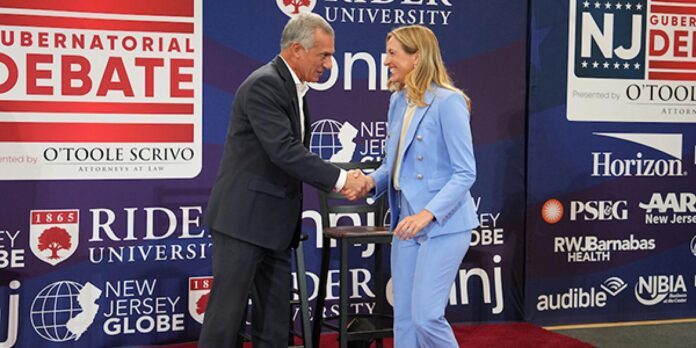New Jersey voters got their first extended look at the 2025 gubernatorial candidates on Sunday, September 21, as Democrat Mikie Sherrill and Republican Jack Ciattarelli squared off in a debate at Rider University in Lawrenceville. The 90-minute session, attended by roughly 1,500 people, touched on key issues including school district consolidation, rising energy costs, sanctuary policies, and broader economic concerns, while also highlighting the partisan tension shaping the state’s political landscape.
The debate began with a clash over school district consolidation, a perennial topic in a state known for its high property taxes and fragmented local governance. Sherrill emphasized a strategy of incentivizing voluntary mergers between districts but signaled that mandatory consolidation could be considered for districts that fail to adequately fund education despite high taxes. Ciattarelli, by contrast, maintained that government should not force mergers, advocating instead for incentives and support for municipalities and districts that voluntarily pursue consolidation.
Rising energy costs were another focal point, as voters grapple with high electricity bills and the broader cost of living. Ciattarelli criticized Democratic control of the state legislature for driving energy prices upward and outlined proposals to leverage natural gas and nuclear power while lowering property taxes through a revised school funding formula. Sherrill, while acknowledging energy costs as a critical issue, did not provide detailed policy proposals during the debate, instead emphasizing a commitment to transparency and the need to declare a “state of emergency” to address the state’s energy challenges.
New Jersey’s sanctuary policies also drew contrasting views. Ciattarelli pledged to eliminate the state’s Immigrant Trust Directive, framing it as part of a broader effort to reduce sanctuary city protections. Sherrill defended the policies while stressing the importance of maintaining public safety and balancing enforcement with community trust.
The debate also featured exchanges on national politics, with Sherrill frequently tying Ciattarelli to former President Donald Trump and his political agenda. Ciattarelli countered by highlighting areas where he aligns with past Trump policies, such as opposition to offshore wind farms, congestion pricing in New York City, and adjustments to the SALT deduction cap. He also noted his independence, citing his call for then-Governor Chris Christie to resign during Christie’s second term as an example of acting against party loyalty.
Audience behavior added a colorful backdrop to the debate, with frequent cheering, booing, and occasional interruptions. One attendee shouted during Sherrill’s remarks, prompting her to address the crowd directly: “There are children here.” Moderator Laura Jones struggled to maintain order, a reflection of both the passionate engagement of New Jersey voters and the sometimes theatrical nature of political events in the state.
On property taxes, a perennial concern for residents, Sherrill advocated for increased shared services and potentially county-based school systems to reduce administrative overhead. Ciattarelli defended “home rule,” acknowledging that residents often prefer local control even if it results in higher costs. On New Jersey Transit, Sherrill highlighted her work in securing funding for the Gateway Tunnel to Manhattan, while Ciattarelli proposed consolidating toll roads and transit systems under a single authority to improve efficiency, though without extensive detail.
Other topics touched on included health and education policies, with Ciattarelli implicitly addressing opposition to transgender women participating in women’s sports. The candidates also sparred over campaign ads, with Sherrill rejecting Ciattarelli’s claims about her stock trading and Ciattarelli calling Sherrill’s tax claims misleading.
While the debate offered insights into each candidate’s positions and temperament, analysts note that it is unlikely to dramatically shift voter preferences. Most undecided voters in New Jersey appear limited, and both candidates maintained a disciplined, measured tone without making major gaffes.
Student participation added a unique element, with questions ranging from policy specifics to broader questions about honesty and integrity. One middle schooler even referenced a recent scandal involving a U.S. senator from New Jersey, demonstrating the blend of civics education and public interest that makes New Jersey debates uniquely engaging.
As the campaign moves forward, voters will continue to weigh the candidates’ approaches to governance, taxes, education, and public safety. The first debate provided a substantive, if occasionally chaotic, look at the priorities and personalities shaping the 2025 gubernatorial race. Additional coverage and analysis of New Jersey politics and campaigns can be found here.












